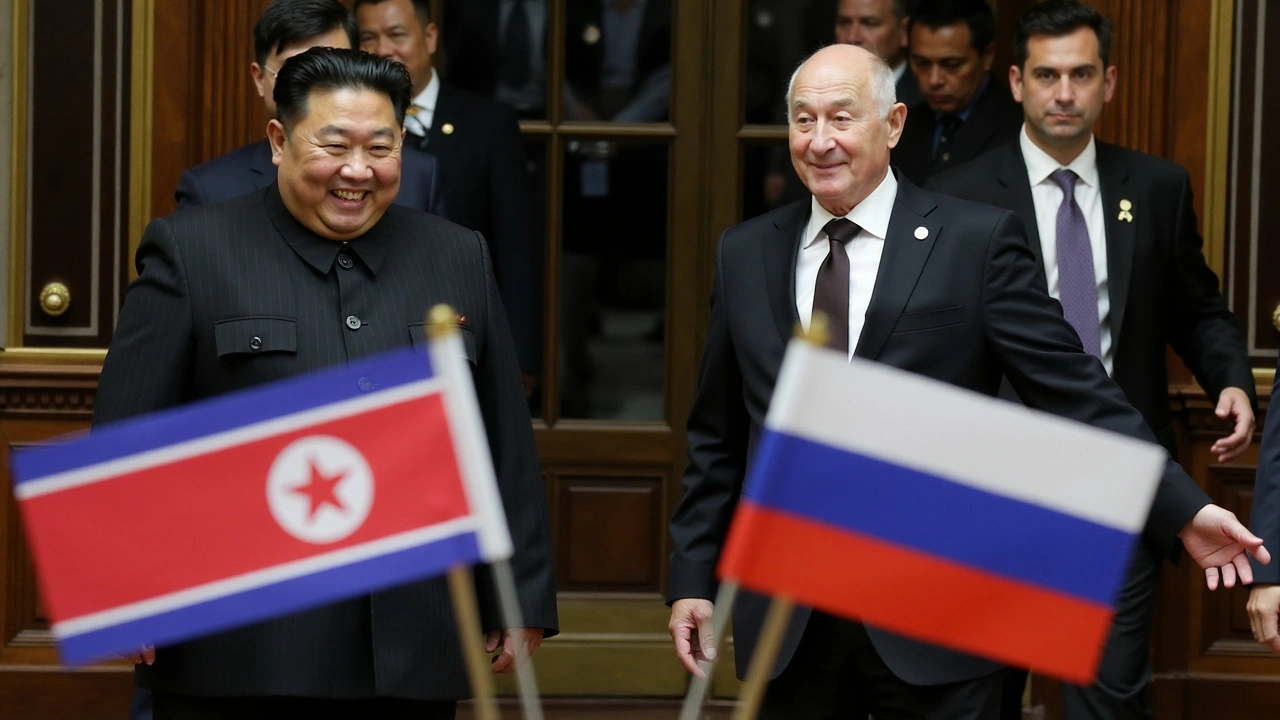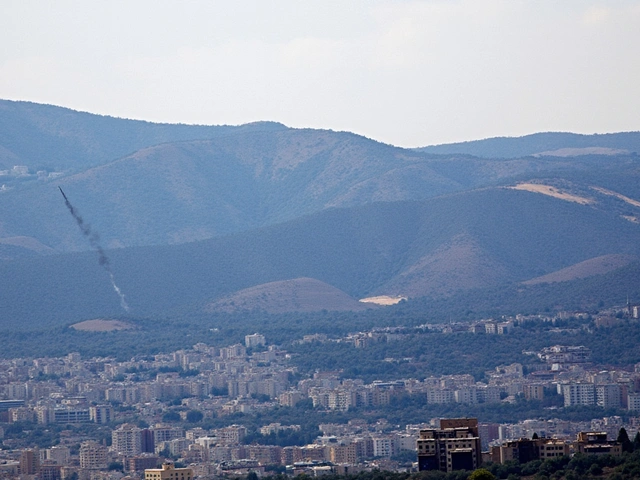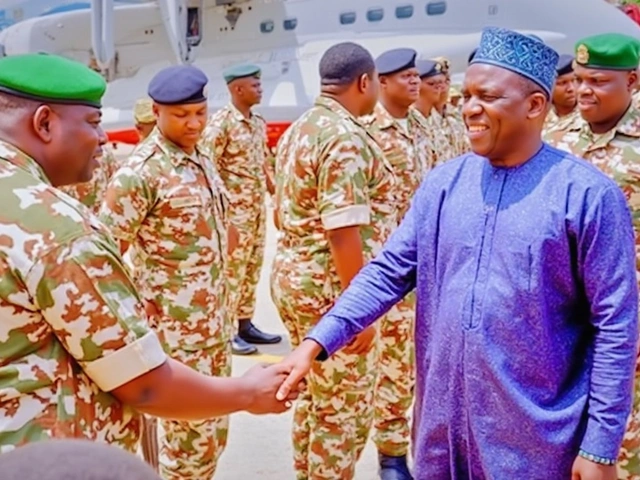South Korea's Strategic Response to Alleged North Korean Troop Movements
After reports surfaced suggesting that North Korea has deployed troops to Russia, South Korea has issued a stern warning that it could supply arms to Ukraine in response. This unprecedented move could mark a significant shift in Seoul's approach to the ongoing conflict, which has been marked by caution so far. South Korea's government, during an emergency National Security Council meeting, conveyed the potential threat these developments pose to both regional and global security. Officials likened North Korea to a 'criminal group,' exploiting its youth as mercenaries for what they called an unjustifiable war. These events might open a new chapter in South Korean foreign policy, as they weigh sending both defensive and potentially offensive weapons to Ukraine.
Concerns Over North Korea's Pursuit of Russian Technology
The South Korean administration's fears are compounded by the potential flow of advanced military technologies from Russia to North Korea. Such an exchange could bolster Pyongyang's missile and nuclear programs, directly impacting the security dynamics on the Korean Peninsula. Russian technological help could enable North Korea to significantly modernize its outdated conventional weaponry and even acquire a space-based surveillance system, posing an advanced threat to South Korean national security. South Korea is evaluating a comprehensive suite of response measures—diplomatic, economic, and military—to mitigate these emerging threats.
Contextualizing South Korea's Reluctance and Recent Developments
South Korea has maintained a policy of non-engagement in active military conflicts, choosing to support Ukraine through humanitarian and financial aid while adhering to U.S.-led economic sanctions against Russia post-invasion. However, the possibility of sending arms to Ukraine could signify a policy pivot due to the escalating tensions and military exchanges between North Korea and Russia. South Korea's spy agency has validated the dispatch of around 1,500 North Korean special operation forces to Russia this month, fueling the urgency of these deliberations. Allegations from Ukraine's President Zelenskyy indicate the potential presence of up to 10,000 North Korean troops ready to reinforce Russian military operations.
Denials and International Reactions
Both North Korea and Russia have staunchly denied any troop movements or armament exchanges, dismissing these reports as baseless rumors intended to damage the image of the North. During a United Nations Security Council session, Russia refuted South Korean claims alongside Western accusations involving Iran and China. A North Korean diplomat similarly dismissed these allegations as unfounded during a UN committee meeting. Despite these denials, the United States and NATO have expressed concern, viewing the prospect of North Korean troop deployment as a potentially destabilizing factor in the region. U.S. Deputy Ambassador to the UN, Robert Wood, highlighted the danger of these developments, affirming ongoing consultations with allies.
The Wider Implications for Global Security
The intersection of North Korean troops allegedly operating in Russia and the potential South Korean military assistance to Ukraine could reshape geopolitical alignments and strategies markedly. It underscores a dangerous trend where rogue states might engage in reciprocal arrangements to strengthen militaristic capabilities, possibly triggering a new arms race. These developments necessitate an acute focus on diplomatic engagement and strategic deterrence to avert exacerbating regional conflicts. A sophisticated balance between pressures, such as sanctions and military readiness, must be maintained while remaining open for dialogue and peaceful resolutions.
Watchful Eyes on Further Developments
As tensions simmer, the international community remains vigilant, eying any further collaboration between North Korea and Russia. The evolving Korean peninsula's political terrain calls for responsive measures that ensure regional stability without provoking direct confrontations. South Korea's contemplation of arms distribution to Ukraine reflects the serious nature of these concerns and the delicate act of balancing national interests with international responsibilities.







Saurabh Jain October 23, 2024
This is a dangerous path. Arms transfers might feel like a strong stance, but it risks pulling South Korea into a conflict it has wisely avoided for decades. The regional fallout could be worse than the current situation.
Suman Sourav Prasad October 24, 2024
I mean, come on, they’re already sending aid, right? Why escalate? If North Korea’s sending troops, that’s bad, but Korea supplying weapons? That’s a whole new game-like lighting a match in a powder keg.
Nupur Anand October 24, 2024
Oh please. Let’s not pretend this is about ‘security.’ This is geopolitical theater dressed in moral outrage. South Korea’s playing the ‘responsible democracy’ card while quietly hoping the U.S. will bear the consequences. The hypocrisy is breathtaking. They want to be seen as a global actor without accepting the cost of real power-like a child demanding a sword but refusing to learn how to swing it.
Vivek Pujari October 24, 2024
The strategic asymmetry here is undeniable. North Korea’s hybrid warfare model-proxy troops + tech exchange-is a classic asymmetric escalation vector. South Korea’s potential arms transfer would be a kinetic counter-normative response, destabilizing the non-proliferation regime’s fragile equilibrium. We’re entering a phase where deterrence theory must be recalibrated for non-state-aligned actors.
Ajay baindara October 24, 2024
South Korea’s been spineless for too long. If North Korea’s sending killers to Russia, then Seoul should be sending missiles to Kyiv-not speeches. No more appeasement. No more ‘diplomatic nuance.’ This isn’t a debate. It’s survival.
mohd Fidz09 October 25, 2024
You think this is about Ukraine? Nah. This is about China. South Korea’s trying to prove to Washington it’s not just a passive economic satellite. They’re screaming ‘I’m still relevant!’ by throwing weapons into a war they don’t fully understand. Classic case of overcompensating for geopolitical insecurity. And don’t even get me started on how Russia’s laughing all the way to the missile factory.
Rupesh Nandha October 26, 2024
There’s a deeper tension here-between sovereignty and solidarity. South Korea has always balanced its alliance with the U.S. against its historical trauma with militarism. Sending arms isn’t just policy-it’s a cultural reckoning. Are they willing to trade their identity as a peace-oriented society for the illusion of security? And if they do, what does that say about the global order when even non-aligned democracies are being pulled into proxy wars?
suraj rangankar October 27, 2024
Listen-this isn’t about who’s right or wrong. It’s about timing. If North Korea’s really sending troops, and Russia’s giving them tech, then South Korea’s got two choices: act now or regret it later. Don’t wait for the first missile to hit Seoul before you realize you should’ve moved sooner. Be bold. Be smart. Be ready.
Nadeem Ahmad October 27, 2024
Interesting. I wonder how many of these North Korean troops even know they’re fighting for Russia instead of their own regime.
Aravinda Arkaje October 28, 2024
This is the moment South Korea steps up. Not because it’s easy, but because it’s right. You don’t let tyranny go unchallenged just because it’s far away. Ukraine’s fighting for all of us. If Seoul can help, they should. No excuses. No delays. Do it.
kunal Dutta October 29, 2024
The irony? South Korea’s biggest export is semiconductors. If they start shipping weapons, they might as well start exporting their entire defense industrial complex. The real question isn’t whether they’ll send arms-it’s whether their own domestic industry can scale fast enough to meet demand without compromising quality. And no, ‘Korean-made’ doesn’t automatically mean ‘better than Russian junk.’
Yogita Bhat October 29, 2024
Oh wow, so now we’re pretending this is about democracy? Let’s be real-this is about who gets to control the next generation of missile tech. North Korea wants Russian drones. Russia wants Korean batteries. Ukraine’s just the pawn in a game no one’s willing to name. And South Korea? They’re trying to be the hero without realizing they’re already in the villain’s script.
Tanya Srivastava October 29, 2024
I think this whole thing is a CIA psyop. North Korea doesn’t even have 1500 troops to spare-they’re starving. And Russia? They’re using fake intel to make the West look paranoid. Also, why is Zelenskyy suddenly quoting some random blog? Suspicious. And why are all the sources linked to francischouler.co.za? That’s a .za domain. That’s South Africa. This is all fake. #DeepState
Ankur Mittal October 30, 2024
Makes sense. If the intel’s verified, then arms supply is a proportional response. But they need to be careful-don’t overcommit. Quality over quantity.
Diksha Sharma October 30, 2024
I bet this is all a distraction. They’re trying to hide the fact that South Korea’s economy is crashing. Also, did you know the moon landing was faked? And that North Korea’s troops are actually robots controlled from Pyongyang? I read it on a forum. Someone said the UN has a secret treaty with aliens. This is all connected.
Akshat goyal October 30, 2024
Respectful silence on this one. Too complex.
anand verma October 31, 2024
The international community must approach this development with the utmost gravity. The erosion of normative boundaries regarding state-sponsored military collaboration constitutes a fundamental challenge to the post-1945 liberal order. Diplomatic channels must be reactivated with urgency, and multilateral frameworks-particularly those anchored in the Charter of the United Nations-must be reaffirmed with renewed vigor. The path of escalation, however rhetorically compelling, risks irreversible fragmentation.
Amrit Moghariya November 1, 2024
So… we’re all just pretending this isn’t about China? Korea’s scared their neighbor’s getting stronger. They’re not helping Ukraine-they’re trying to impress America. Meanwhile, the real winners? The guys selling the weapons. Always are.
shubham gupta November 1, 2024
The real risk isn’t the arms transfer-it’s the precedent. Once you start sending weapons to one conflict, you open the door for others to demand the same. That’s how regional arms races begin. Better to focus on intelligence sharing and sanctions enforcement. Less flashy, but far more sustainable.
Gajanan Prabhutendolkar November 1, 2024
Let’s be honest-this is all just a distraction from South Korea’s own domestic mess. Unemployment’s rising, youth are leaving, and the president’s approval rating’s in the toilet. So they’re trying to look strong on the world stage by pretending they’re playing NATO. Meanwhile, their own military’s underfunded and their own people are wondering why they’re being dragged into someone else’s war. Classic case of elite overreach. And don’t even get me started on how the media’s hyping this up like it’s a Netflix documentary. I’m not buying it.